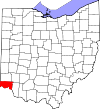Mariemont Historic District
Mariemont Historic District | |
 The Mariemont Inn | |
| Location | Mariemont, Ohio |
|---|---|
| Area | 3,190 acres (12.9 km2) |
| Architect | John Nolen [1] |
| Architectural style | American colonial and Greek Revival[1] |
| NRHP reference No. | 79001862[1] |
| Added to NRHP | July 24, 1979[1] |
Village of Mariemont | |
| Location | Mariemont, Ohio |
|---|---|
| Built | 1920 |
| Architect | Nolan;Emery;Livingwood;Anderson,G.; Atterbury;Cellarius;Dana;Howe, et.al |
| Architectural style | Late 19th And 20th Century Revivals, Late 19th And Early 20th Century American Movements |
| NRHP reference No. | 07000431 |
| Significant dates | |
| Added to NRHP | March 29, 2007[1] |
| Designated NHLD | December 5, 2006[2] |
Mariemont Historic District and Village of Mariemont are one or two overlapping historic districts in Mariemont, Ohio.
Mariemont Historic District was listed in the National Register of Historic Places on July 24, 1979. It contains 180 contributing buildings. These include single and multiple dwellings and businesses.
Village of Mariemont, which may be just a part, or may be exactly the same district, was designated a National Historic Landmark in 2006, and it, or an extension, was listed on National Register in 2007.
Mariemont itself is a planned community village in Hamilton County, Ohio, United States. Founded in the 1920s by Mary Emery, Mariemont exhibits English architecture from Norman to classic Georgian style. Several parks exist in the village, including the Concourse on Miami Bluff Drive and Dogwood Park, which houses the memorial carillon, offering concerts on Sundays throughout the summer months. The village square serves as the community center with red brick Tudor buildings, including the Mariemont Inn and historical Mariemont Barber Shop. Mariemont also has one of the few elected Town Criers remaining in North America.
On December 5, 2006, the Village of Mariemont was designated a National Historic Landmark.[2]
On March 29, 2007, the Mariemont Historic District was designated a National Historic Landmark.[3]
It is located on U.S. Route 50. It borders both sides of US 50, bounded by Westover industrial section, Beech St., Murray and Grove Aves., and the Little Miami River.[3]
Architects
Architects who did work in Mariemont include:[4] Louis E. Jallade, Robert Rodes McGoodwin, Jack E. Hodell, and Ripley and LeBoutillier.
See also
Notes
- ^ a b c d e f "National Register Information System". National Register of Historic Places. National Park Service. June 30, 2007.
- ^ a b "Mariemont Historic District". National Historic Landmark summary listing. National Park Service. Retrieved 2008-06-16.
- ^ a b National Park Service websites support both dates. One must be wrong, or the second one indicates an increase to the historic district area. Second date supported by this NPS new listing.
- ^ Mariemont Preservation Foundation


